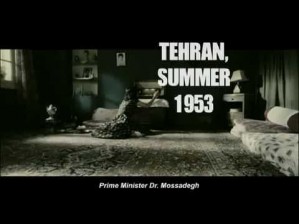
A strange trailer was the best I could find to bring over a feeling for a film hard to be described. May be the closest description is indeed to favor its strong feminine point of view – women looked at in their unique characteristics, restrictions, and ways they find for their desires. A deep melancholy marked all over it .. a singular beauty inscribed and an orchard as the temporary refuge between the times.
Cryptic, but telling .. I am just wondering that these slow images work now, but they do – in their very own sense of freedom!
With this debut feature, the photographer-turned-director Shirin Neshat has made a picture with vision, poetry, sexual frankness and historical sinew. It brings together, on screen, the personal and the political in the story of four women and the way their lives are affected by the turbulence of the anti-Mossadeq coup, and revives the memory of a lost generation of Iranian politics and culture: the westernised liberal intelligentsia, a white-collar class exiled and effaced by the Shah’s regime, but also fiercely repudiated by the theocracy installed by the Islamic revolution of 1979. In some ways, Neshat’s film addresses the same issues as Marjane Satrapi’s Persepolis, and further underlines the fact that it is Iran which, in the 21st century, has repeatedly offered the world a vivid, unapologetically feminist cinema.
World Without Men is based on a 1989 novel by Shahrnush Parsipur, and weaves together the women’s lives in complex and enigmatic ways. Munis (Shabnam Touloueh) is serious, cerebral, obsessed with listening to the radio for the news of the Mossadeq situation, and bullied by her brother for neglecting her demure womanly duties. Munis’s friend Faeseh (Pegah Ferydoni) is in love with this same brother who makes Munis’s life a misery. Fakhri (Arita Shahrzad) is a stylish, elegant married woman in her 40s, in love with an old flame. Finally there is Zarin, a prostitute, played with characteristic intensity by Orsi Tóth, the Hungarian actor who has appeared in Kornél Mundruczó’s films Delta and Johanna.
Neshat’s movie-making style owes something to Mohsen Makhmalbaf, but has absorbed other influences, too – her camera movements are distinctly Tarkovskian. And for the magic-realist tropes of the literary original, Neshat has found a visual manner with something of Buñuel: this surfaces in the disquieting vision of Zarin’s client having an eyeless, mouthless face and also, I think, in the grand dinner-party-cum-soirée that Fahkhri throws in her new orchard estate. The army turn up, intending to search the property for seditious materials, but the troops end up staying for dinner, and their commanding officer exchanges flirtatious badinage with the guests.
Everything is imagined by Neshat with clear-eyed compassion and narrative drive, and she shows a bold candour about sexuality and women’s bodies. The film is shot by cinematographer Martin Gschlacht, who recently worked with Joanna Hausner on Lourdes. He creates tremendous images using painterly, washed-out colour tones, framing dream-like tableaux, but also creating plausible action sequences. Neshat has directed a quietly tremendous film which ensnares both the heart and the mind.
